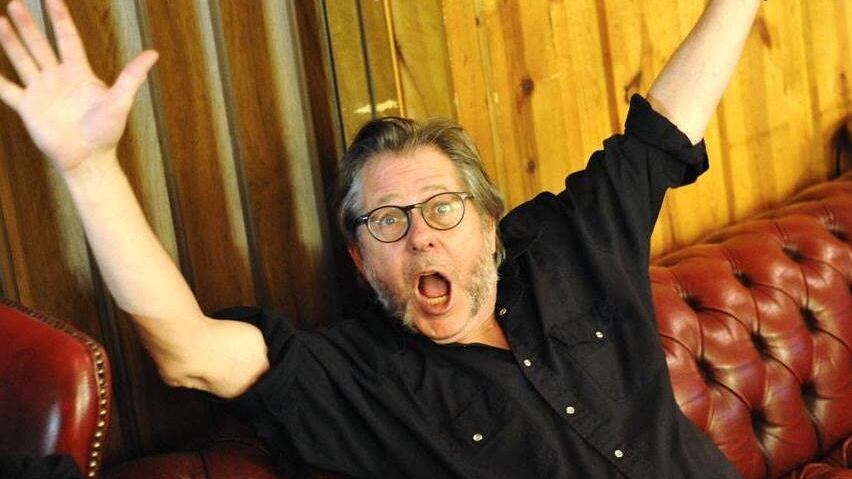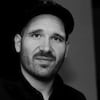Legendary saxophonist Ralph Carney passed away in Portland over the weekend, Consequence of Sound first reported. Carney was 61. He played his last gig of his expansive career on Friday night, with a project called Smut City Jellyroll Society at the O'Neil Pub.
Carney was a Portlander, having recently moved from the Bay Area to a little house in the Roseway neighborhood. I chatted with him there just last week for a project I'm working on—Carney was a witty and warm conversationalist, and we talked about his long career and our shared affinities for Hillary, cannabis and Derf.
Of all the many heartfelt tributes to Carney posted to Facebook today, the one from the cartoonist Derf stands out:
"I consider Ralph a stone-cold genius. Whether listening to him play, or having a conversation with him, his brain just worked in ways beyond that of the rest of us. He was truly one of a kind. As Tom Waits, who he played with for many years, said of him: 'Ralph is a broken toy who is much better off broken.'"
Carney was probably best known as the saxophonist on several of Tom Waits best records, and as the uncle of Black Keys drummer Pat Carney, with whom he wrote the theme song for Bojack Horseman.
But the "king of the New Wave horn" had a 40-year career starting with Tin Huey, a band he joined right after high school recorded an album, Contents Dislodged During Shipment, for Warner Brothers after being signed by Jerry Wexler himself.
“We played and the next thing was ‘We want to sign you to Warner Brothers. Talk about euphoria. ‘I don’t have to worry about nuthin’ ever again in my life!” Carney said. “And then a year later—’What? Why did we break up? And why did we get dropped?’ It was one of those things. In retrospect, it’s like, shit. What are you going to do. You can’t go back and do anything again.”
Tin Huey also included Chris Butler, who was simultaneously writing "Christmas Wrapping" and "I Know What Boys Like" with his side project, The Waitresses.
Tin Huey was a different kind of project—jammy and jazzy, with Carney's off-kilter horns right up front. The first song on the record, a wild cover of "I'm A Believer," was a minor hit in the U.K. (Carney's is at center stage around the two minute mark.)
How did an experimental rock band like Tin Huey get signed to Warner after a few years of playing out, with their biggest accomplishment being a three-night-a-week residency at a pub called J.B.'s in the suburb of Kent?
Well, Carney and Tin Huey were part of a scene centered on a blue collar Akron bar called The Crypt, as Carney described it, a "shitty bar where Goodyear workers would sit around after their shift, nursing their Strohs"—until a band called Devo started playing there.
In the wake of Devo's out-of-nowhere success, the scene exploded in 1978, with Village Voice critic Robert Christgau decamping to the rusted-out former Rubber Capital to scope things out.
Christgau visited Tin Huey's practice space near Highland Square and singled out Carney as a "remarkable young saxophonist," who "wasn't above playing a duck call or using his head as a percussion device." Britain's coolest indie label, Stiff Records, released a compilation of Akron bands, which features a song from Tin Huey.
The band fell apart after their first record flopped and Carney drove up to Woodstock's Experimental Music Studio, where he fell in with the New York free jazz scene, and also played in his first bar band.
"I was playing in my first bar band with this British guy, he went by the name of Johnny Average," he said. "I got to play with these guys and they were doing like Eddie Cochran. Three or maybe four sets at these bar gigs. It was kinda like—every songs is kinda the same. I was used to playing in a band with all these intricate little parts. But I loved it, I learned endurance."
Carney subsequently moved to Brooklyn, where he lived for eight years.
"My first wife got the grants to go to the Pratt Institute so, like, 'OK, you're going to school.' I was a messenger and doing stuff." he said. "New York was great and awful, because it was so much—but it was also great."
In New York, Carney pretty much gave up on having a music career, and was working as a messenger.
"I was meeting some players but it was like, 'Well, those rock star days are over…"
And then he got a call from Paul Wexler, Jerry Wexler's son, who produced the Tin Huey record.
"He was like 'Hey Ralph, I heard you're in New York, man. I'm doing this party mix of B-52s in the Bahamas, in Nassau. What are you doing in two days? Can we fly you down with a saxophone? I was working as a messenger, so it was like, suuuuuuuuure."
After working on the Party Mix! record, the B-52s liked his stuff and invited him to play on their next record, and then to tour with the band.
Carney next connected with Tom Waits, with whom he enjoyed a long collaborative relationship before the singer-songwriter took his band a different direction.
Carney played on records for everyone from St. Vincent to Galaxie 500. He's kept a steady stream of side projects going, including Portland projects the Pepper Grinders and Smut City Jellyroll Society.
"I got to do all this crazy shit—no regrets," he said at the end of our interview. "That's the life, man. I hope to keep doing stuff until I croak."


